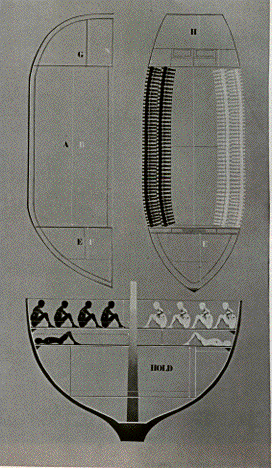|
Mutual Progress Cultural & Intellectual History Lesson 16 (Page 2 of 2) "Hold: Separate but Equal" is part of a series. This painting is a schematic representation of a slave ship blueprint, with two groups of figures trapped in the hold--one black, the other white. Bailey insists that "real revolution won't occur until poor whites as well as poor Blacks realize they are oppressed" (Fine, the Afro-American Artist, 272).
|
